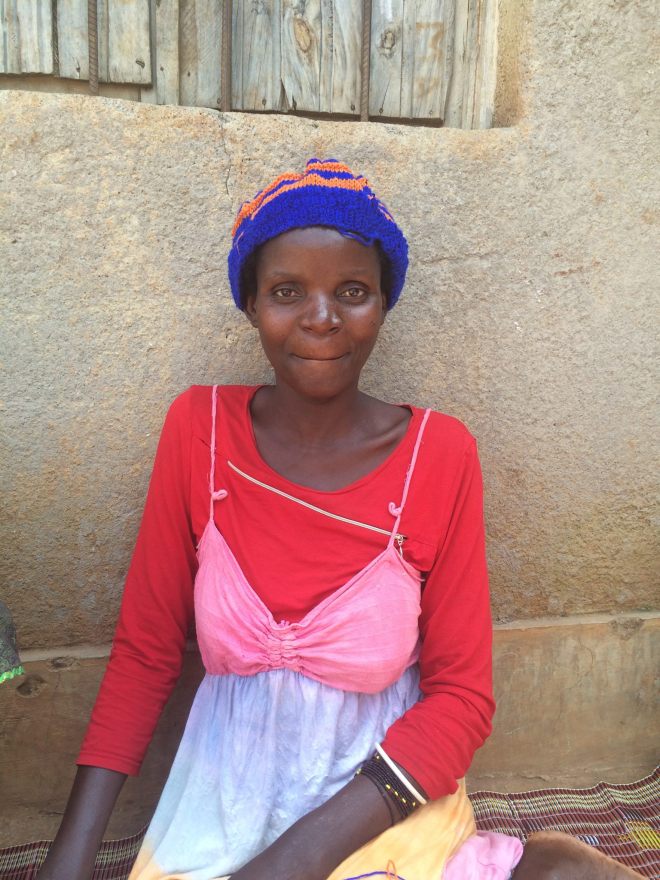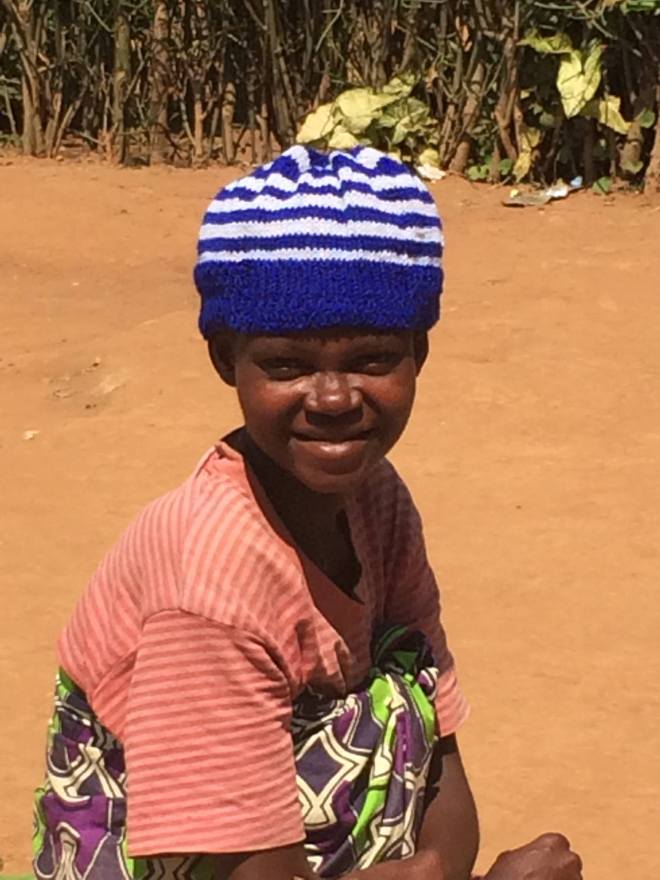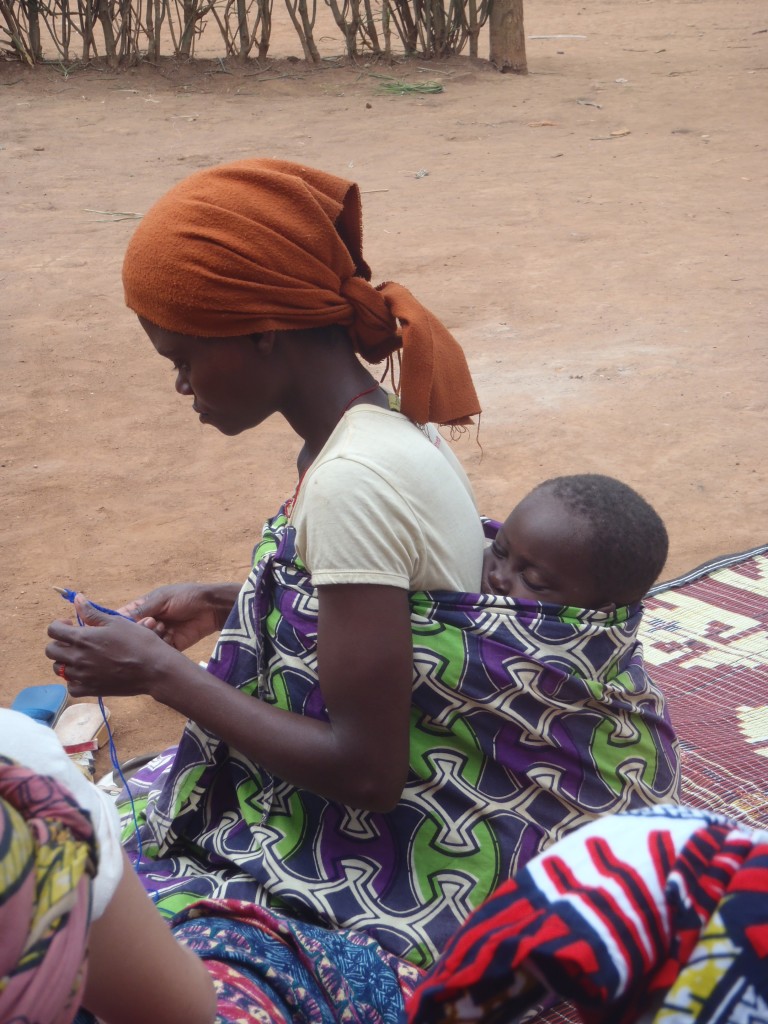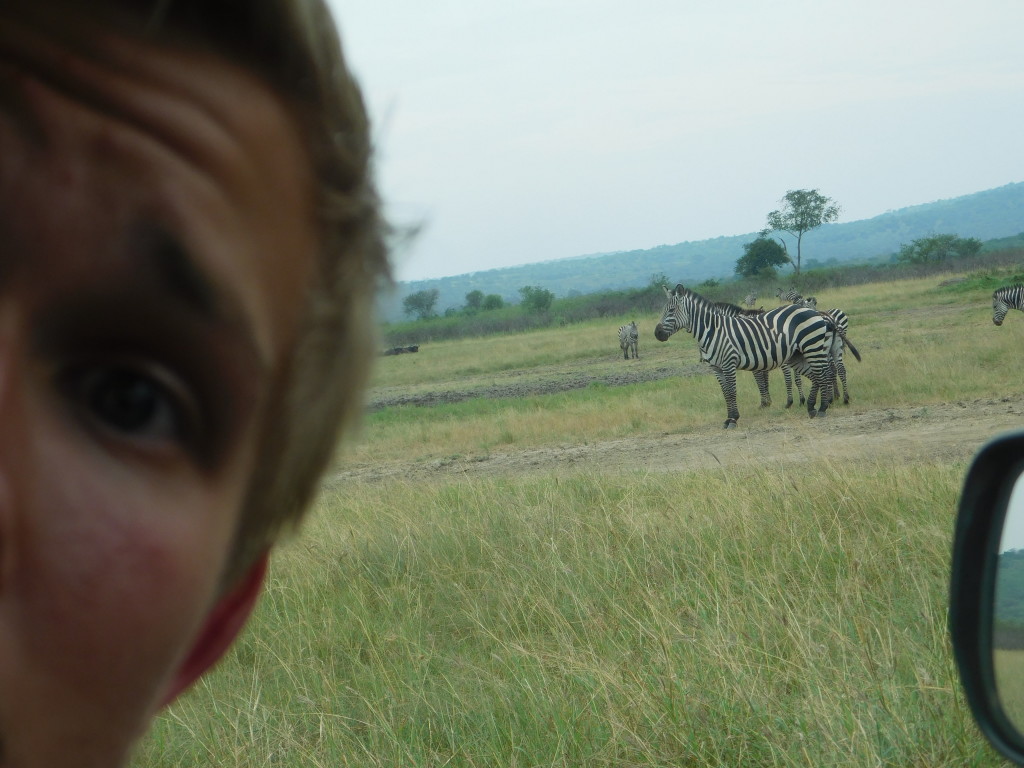This past week we expanded our working style (with business trainings and election prep), our stomachs (with new food and forced creativity), and our repertoire (with hygiene initiatives and rogue references).
On Monday, we had one of our biggest crowds at training in Cyaruzinge; we also had one of our longest knitting trainings to date. Rachel and Sarah started flagging women as potential leaders to train others on how to use the knitting machine, though we later decided it would be best to leave this (and all other positions) up to public vote.
Another woman (Janet) finished her first hat! It’s exciting to see progress happening and it seems to be visibly affecting the way the women approach their knitting. The tangible outcome of a hat appears to be pushing the women to master the skills necessary to get there. This has also led to some frustration among the women: a few of them do not have the skill set necessary to move on and start a hat, but they desperately want to. We’ve tried to work through this by giving positive feedback and spending extra time focused on these women and their technique.

We also discovered that Providence (Cooperative President & Superwoman) had received orders from laborers requesting blue and white knitted hats for 3000 rwf each – this was really exciting news! We have so much to talk about regarding cost analytics and pricing and the seasonality of such a market, but suffice it to say that this has changed the tone a bit in knitting trainings and has provided some traction moving forward.
It’s difficult to get a sense of the complex dynamics at play amongst the cooperative members. There are a lot of situations we can anticipate that could strain these; for example, it’s unclear who should fill this order of hats. Is it just Providence, because she solicited it? Should the hats be divided amongst the most talented knitters? How does comparative advantage come into play when you’re dealing with a cooperative, which focuses on member equality? These questions are not easily answered, but they’re ones that the cooperative will have to deal with sooner or later. It’s difficult to know when to offer advice (which they ask for) and when to step back and recognize that our perception of cooperative dynamics could be totally off.
At the end of the day, when we were gearing up to leave, Nayino showed up. I don’t think we’ve talked about her yet. I also don’t think we’re allowed to have favorites… but Nayino is undoubtedly our favorite cooperative member.
Nayino is deaf, and to the best of our knowledge she cannot read or write. She doesn’t use sign language in the traditional sense, but through working with her Rachel has established a general system of hand gestures that allow her to communicate knitting stiches. She also has a small baby who, as was translated through Claude, has a disease or condition with symptoms similar to Parkinson’s; the baby use to be able to walk but then experienced some sort of neurodegeneration that caused her to have partial paralysis and tremors.
Nayino herself has a stellar attitude. She is generally quiet and smiley, sometimes using incoherent sounds to voice her concern, approval, or need. She also makes really good products; her knitting stitches are some of the cleanest and most uniform in the group.
We were especially happy to see her on Monday, and we quickly assessed her hat and decided it was time for her to decrease. If you are unfamiliar with this vague knitting lingo, “decreasing” refers to the systematic and gradual grouping of stitches at the top of a hat to make it join together.
The problem is, decreasing is pretty difficult to get across. Even in talking with the Cyaruzinge women, it takes a translator and a lot of motioning to communicate the patterns of stitches that need to be grouped together in each concentric row. The rows themselves have patterns that need to be communicated in order to successfully complete a hat. So. For Nayino, we had to quickly devise a plan to communicate decreasing so that she could spend time working on her hat before our next meeting (because 1. She generally does this anyway, and 2. We didn’t know the next time we would see her, because she doesn’t attend every training).
Rachel and Hannah drew up a quick diagram in a notebook; using a system of boxes, dots, and bars, they made a makeshift drawing to explain the process. Rachel presented this to Nayino and walked her through the process with gestures and counting motions. It took a while but Nayino was fascinated by the diagram and seemed eager to work on it!
After training, we came home to Chez Theó and headed out in a quest for the ever-elusive WiFi. Later that evening, we went to SoleLuna and met the family of Beth Larsen, who worked at HDI for over a year and half and who spent a lot of time with last year’s Nourish team. She was visiting Rwanda for a week with her parents coming off of a three-month French immersion program. She is also Amber’s cousin and was once Kaleigh’s college roommate; she is responsible for raising a lot of the funds to allow Kaleigh, Julie, and Amber to work here in the first place.
It was nice to meet them and talk a little bit about our experience with the community. Beth was one of the people who wrote this year’s Nourish project proposal, so while it’s been frustrating not to have Josephine (the other contributor) to talk through our community questions, it was a cool opportunity to flesh out project details with someone who had a vision for this project in the beginning and understands its potential challenges.
On Tuesday, we spent the morning working and eating at ABC Bagel. Weirdly enough, we ran into some Duke students?? We noticed a girl wearing a Duke shirt getting up to leave and asked her about it; turns out there are ten Pratt (engineering) students working in a northern province building a bridge, and they send three students into Kigali each week for supplies, etc. It was cool to meet them (we gave them our email lol) but it was also hilarious to see the faint underlying tension in our conversation… that UNC-Dook rivalry transcends national borders.
In the afternoon we met Claude in Nyamirambo to find the woman who could supposedly fix our knitting machine. If you’ve read our last report about trying to fix the knitting machine, you can understand our hesitation in heading out on this trek…
But she fixed it! It took literally 30 seconds for her to slide out the appropriate bar and replace the broken hook. We sat there half-impressed and half-embarrassed at the ease of repair.
We also had the chance to talk to the woman about her own experience knitting and how she makes her products; she uses French pattern books and these sheets with holes in them to feed into the knitting machine and create patterns in the products. We discovered that this feature on our knitting machine was broken but decided to hold off on repairs and let the women start using the machine ASAP to learn how to make the basic flat products.
We returned mostly-triumphantly from Nyamirambo, transcribed notes, and ate with Theó. P.S. We used a taxi this time 😉
On Wednesday, we went to training trailed by Beth and her parents. Beth’s mom (Anna) does a lot of crocheting and Beth’s dad (Scott) is a businessman (to be vague), so basically they are a project power couple.
Scott entertained the Cyaruzinge kids with his trusty camera and eyeglasses while Anna sat with us and crocheted flowers for the women to attach to their hats. We thought about teaching a crochet lesson with her but the time constraint kept that out of the question.
On this day Nayino finished her hat! She hesitated on using our diagram but returned with it to consult with Rachel. Rach coached her through the diagram and she caught on quickly. Her hat was the first to be graced with a crocheted blue flower. It was a beautiful thing.
 While knitting training took place, Hannah and Connor had the chance to talk more with Beth about her experience at HDI and what her future plans are. It was refreshing to hear the perspective of someone who has been so invested in HDI and now reflects on the organization from a detached point of view.
While knitting training took place, Hannah and Connor had the chance to talk more with Beth about her experience at HDI and what her future plans are. It was refreshing to hear the perspective of someone who has been so invested in HDI and now reflects on the organization from a detached point of view.
After training we came back, ate lunch, finally found someone to translate the cooperative training documents, and got to work in the crowded office. We spent some time speaking with Kagaba about HDI’s endeavors in WASH (Water, Sanitation, and Hygiene) and their plans to leverage partnerships with larger organizations to promote best practices in the Community of Potters and other critical areas.
Later on we (and by we I mean pretty much just Sarah + our occasional supervision) tackled the job of making gnocchi and stovetop brownies. Theó tends to take his position as Chief of Kitchen very seriously and can get pretty stressed out when we try to make our own food. He was weirded out by the texture of gnocchi and decided to make fried bananas alongside us. Highly recommend that these be included as a staple of any and every state fair from this point on, if they aren’t already.
On Thursday, we spent a lot of time in the office working on a business/election training plan for Friday. This training document comprised our coupling of Kigali City Council training packets and our own knowledge gained through interviews with cooperative leadership; we were training on the question “What is a cooperative?” by stressing cooperative values of collective ownership and member engagement as well as by laying out the roles and responsibilities to be chosen in the upcoming election.
We also created an activity made up of five different scenarios. Each one details a problem that the cooperative may very likely have to deal with in the indeterminate future. We then wrote out questions to be translated to the cooperative members in order to gauge their hold on the nature of responsibilities for each role.
In the midst of all of this we had lunch with Muad and Saskia. It was cool to talk with them a bit more about their experience working for the Rwandan Minister of Health, because we’ve only heard of her from the perspective of an NGO that constantly needs her approval.
After we finalized and printed our training documents, we headed to Connor and Hannah (and Amber and Yannick and Oscar)’s house for dinner with Beth’s family, Kaleigh, and Julie. We had a surprise visit from Cassien, HDI’s beloved former Programs Director who is now studying in a Biostatistics Masters program in Sweden. Everyone was thrilled to see Cassien and we had some dank (in the colloquial sense of the word) spaghetti and meatballs. Overall A+ meal.
On Friday, we focused on the business training and gathered the women in their Cell office to speak with them about all the aforementioned things. The training was long but went (surprisingly?) well, though we were missing several members and there was some initial confusion regarding the purpose of the training. Claude translated for us the whole time.
Providence and Claudine, two members who had attended previous finance and cooperative trainings sponsored by the Kigali City Council, expressed their appreciation that we were communicating much of the same information they had learned. This was great to hear but also highlighted a key issue we have noticed: lack of communication among cooperative members.
Unfortunately the last few roles were rushed because we had to get the HDI car back to the office, and we didn’t have time to do the activity. However we felt good that the training was interactive and—until the very end—fairly engaging. We made plans to reinforce the roles before the elections.
We returned to the office late, ate lunch, and debriefed the training. Providence had asked that we translate our training document into Kinyarwanda so that this information could be preserved, so we searched around for anyone willing to take on the job on a Friday afternoon.
We encountered interesting dissent from Programs Director Telesphore when we broached the idea of going into the community on Saturday to drop off translated documents (and play soccer with Claude and his team).
At first, Telesphore was concerned because he thought we had initiated the elections. After we explained to him that the women proposed elections as a result of what they learned in KCC trainings—namely a spirit of collective ownership—he was placated, but he still felt uncomfortable with us being present at the elections. He was worried that our presence would influence the outcome of the elections, and that as a result any future problems with the structure would be attributed to HDI.
His claim wasn’t unfounded, but it drew some conflicting opinions from the office staff. After a conversation with Telesphore, Gatete, and Claude, it was decided that any questions regarding elections would be directed at the cooperative and that we would take the word of the members in letting us know what they preferred. Telesphore didn’t want us going to the community during the weekend, but he and Gatete offered to translate the training document so that we could take it Monday. This pushed our elections back two days, but was ultimately preferred because it would give the women more time to understand the roles and responsibilities.
It seemed like Claude was slightly (?) annoyed that Telesphore was making assumptions about the community without having any community grounding, and it brought to the surface a discussion amongst the interns about program oversight, or lack thereof.
That’s about it for this week, as we’re constantly in the state of processing things. We’ve realized that trainings are flying by and there is still so much to be accomplished; we’re starting to feel the pressure of fitting everything in before we leave.
There’s still so much to see in and around Kigali! More updates to come! This weekend we had a … colorful (i.e. authentic, painful, interesting, enriching) experience in Akagera National Park this weekend. Here’s a sneak peek:


